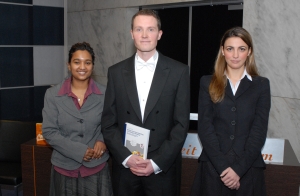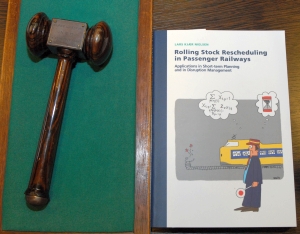Rolling Stock Rescheduling in Passenger Railways
 Reliable and punctual public transportation is of chief importance for workforce mobility and access to cities. In particular, the performance of passenger intercity railway systems continues to receive much public attention in the Netherlands and other European countries. Over the last decade, an increasing amount of effort has been put into developing innovative methods for planning railway resources in order to improve service levels and cut costs. In his doctoral thesis Rolling Stock Rescheduling in Passenger Railways, Lars Nielsen analyses the real-time control of passenger railway systems and in particular on the rescheduling of railway resources during and after disruptions. In this process the rescheduling of the rolling stock, i.e. the train units, poses a major challenge for the dispatchers.
Reliable and punctual public transportation is of chief importance for workforce mobility and access to cities. In particular, the performance of passenger intercity railway systems continues to receive much public attention in the Netherlands and other European countries. Over the last decade, an increasing amount of effort has been put into developing innovative methods for planning railway resources in order to improve service levels and cut costs. In his doctoral thesis Rolling Stock Rescheduling in Passenger Railways, Lars Nielsen analyses the real-time control of passenger railway systems and in particular on the rescheduling of railway resources during and after disruptions. In this process the rescheduling of the rolling stock, i.e. the train units, poses a major challenge for the dispatchers.
In his thesis, Nielsen suggests that a decision support system based on mathematical modelling can improve the performance of the disruption management at large railway operators. In particular, the use of such a system allows the operator to better match available seat capacity with passenger demand and thereby improve customer satisfaction. Furthermore, the operator can respond to irregular operations in a timely manner and better understand the consequences of potential real-time decisions. These aspects allow the operator to cut costs while improving service levels.
Lars Nielsen defended his dissertation on February 11, 2011 at Rotterdam School of Management, Erasmus University (RSM). His promoter was Prof.dr. L.G. Kroon, Professor of Quantitative Logistics at RSM. Co-promoter was Dr. G. Maróti, Assistant Professor, Decision and Information Sciences at RSM. Other members of the Doctoral Committee were Prof.dr. A.P.M. Wagelmans, Prof.dr. A. Caprara and Dr. D. Huisman.
About Lars Nielsen
Lars Kjær Nielsen was born on September 30th 1979 in Herning, Denmark. He obtained his pre-university education at the Nordfyns Gymnasium, Søndersø, in 1999 before serving 8 months military service from 1999 to 2000. From 2000 Lars studied computer science and mathematics at the University of Southern Denmark, Odense, and obtained his Master’s degree in early 2006. The Master’s project was conducted in cooperation with the railway operator DSB S-tog A/S. This cooperation led to a four month position as an analyst at DSB S-tog A/S in Copenhagen where he applied the methods developed in the Master’s thesis to real life data.
In September 2006 Lars moved to Rotterdam to become a PhD candidate at the Department of Decision and Information Sciences of the Rotterdam School of Management, Erasmus University. During this period he attended conferences such as INFORMS Annual Meeting in Washington D.C. 2008, 23rd European Conference on Operational Research in Bonn 2009, and TRISTAN VII in Tromsø 2010. Lars was awarded the first prize in the 2008 INFORMS Railway Applications Section Student Paper Award and together with Gábor Maróti he was awarded the prestigious EURO Management Science Strategic Innovation Prize 2009. At the time of writing, a paper based on the results of this thesis is in review at the European Journal of Operational Research.
Abstract of Rolling Stock Rescheduling in Passenger Railways
 Modern society is highly dependent on a reliable railway system for workforce mobility and easy access to the cities. However, the daily operations of a large passenger railway system are subject to unexpected disruptions such as rolling stock breakdowns or malfunctioning infrastructure. In a disrupted situation, the railway operator must adapt the timetable, rolling stock and crew to the modified conditions. This adaptation of resource allocations requires the solution of complex combinatorial problems in very short time and thus represents a major challenge for the involved dispatchers. This thesis focuses on developing models and solution methods for the rescheduling of the rolling stock during disruptions. The models incorporate service aspects (such as seat capacity), efficiency aspects (such as number of kilometres driven by the rolling stock), and process related aspects (such as the need for night-time relocation of rolling stock).
Modern society is highly dependent on a reliable railway system for workforce mobility and easy access to the cities. However, the daily operations of a large passenger railway system are subject to unexpected disruptions such as rolling stock breakdowns or malfunctioning infrastructure. In a disrupted situation, the railway operator must adapt the timetable, rolling stock and crew to the modified conditions. This adaptation of resource allocations requires the solution of complex combinatorial problems in very short time and thus represents a major challenge for the involved dispatchers. This thesis focuses on developing models and solution methods for the rescheduling of the rolling stock during disruptions. The models incorporate service aspects (such as seat capacity), efficiency aspects (such as number of kilometres driven by the rolling stock), and process related aspects (such as the need for night-time relocation of rolling stock).
The thesis contains applications of the developed models in three different contexts. First, it presents a framework for applying the rescheduling models in the highly uncertain environment of railway disruption management, and the trade-off between computation time and solution quality is demonstrated. Second, the rolling stock rescheduling models are embedded in a simulation framework to account for the dynamic passenger behaviour during disruptions. This framework allows for a significant decrease in the delays experienced by passengers. Third, the rescheduling models are applied to real-life planning problems from the short-term planning department of the Netherlands Railways. The models lead to a considerable speed-up of the process and significant savings.


